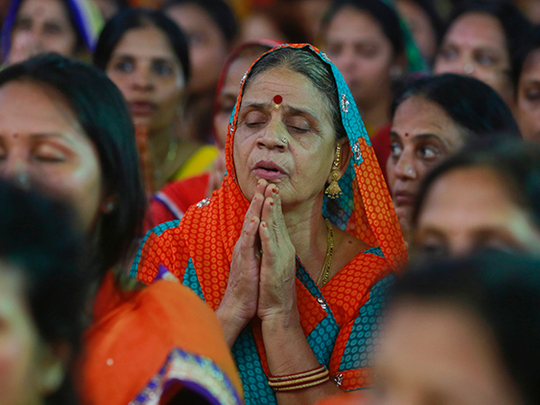
New Delhi: Minutes after the Supreme Court (SC) suspended the Rajasthan High Court’s (HC) decision that said Sallekhana or Santhara — a ritual fast to the death — was akin to suicide and therefore punishable, an 82-year-old woman in Rajasthan declared that she had undertaken Santhara since July 25.
A resident of Bikaner’s Gangashahar, Badani Devi has given up food completely and only takes a few teaspoons of water after sunrise and before sunset. Since she wanted to steer clear of legal trouble, she had earlier decided not to declare her Santhara vow.
To Jains, death by Santhara is an act of supreme renunciation and great piety, which only the most spiritually pure undertake. Representatives for the community argue that Santhara is an ancient religious practice aimed at self-purification.
The vow of Santhara is taken when all purposes of life have been served, or when the body is unable to serve any purpose of life. It is not the giving up of life, but taking death in their stride, they say.
But human rights activists allege that it is a social evil, and old people are made to undertake it by family members who do not want to look after them for a variety of reasons.
In 2006, human rights activist Nikhil Soni and his lawyer Madhav Mishra filed a Public Interest Litigation (PIL) with Rajasthan HC, claiming that Santhara should be considered suicide under the Indian legal statute. They argued that Article 21 of the Indian Constitution only guarantees the right to life, but not to death.
They argued that if euthanasia is not allowed, practice of ‘Sati’ (widow suicide) is banned, and suicide is illegal in the country, Santhara cannot be allowed either.
In response, the Jain community argued that it is a violation of the Indian Constitution’s guarantee of religious freedom. It was argued that Santhara serves as a means of coercing widows and elderly relatives into taking their own lives.
This landmark case sparked debate in India, where national bioethical guidelines have been in place since 1980. In August 2015, the Rajasthan HC stated that the practice is not an essential tenet of Jainism and banned the practice. On August 24, members of the Jain community held a peaceful nationwide protest against the ban. They took to the streets immediately by organising protest rallies. In meetings held before the rallies, members of the community openly criticised the judges, calling them ignorant and disrespectful of religious practices.
Hindu fundamentalist outfit Vishwa Hindu Parishad (VHP) expressed “sadness and agony” over the ban.
“It has become fashionable to denigrate age-old customs followed by the people of the country for which a westernised education system, which gives rise to a pseudo-secular mindset, is to be blamed. The High Court order is tantamount to interference in matters relating to religion and culture, and we express sadness and agony over the same,” VHP international president Pravin Togadia said in a statement.
Members of Jain community had filed a couple of petitions challenging the August 10 HC ruling and lined up a bevy of senior advocates — A M Singhvi, Harish Salve and Gopal Subramaniam — to advance arguments to convince the supreme court that the constitutionally guaranteed right to follow a religion of one’s choice included practicing its tenets, traditions and customs.
The army of legal experts did not have to fire at all. The moment the petitions were called for hearing on August 31, a bench of Chief Justice H L Dattu and Justice Amitava Roy dictated the order staying the HC judgement and issued notice to the petitioners, on whose plea the HC had banned Santhara.











